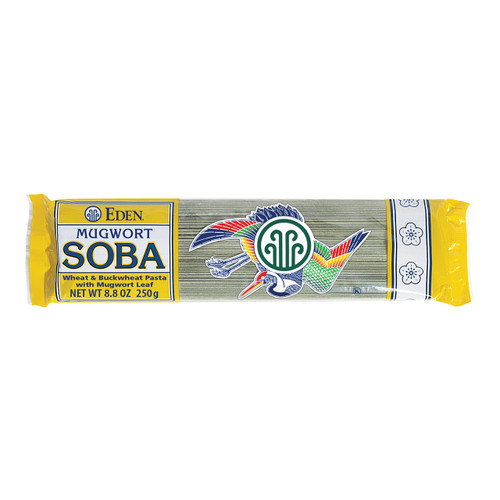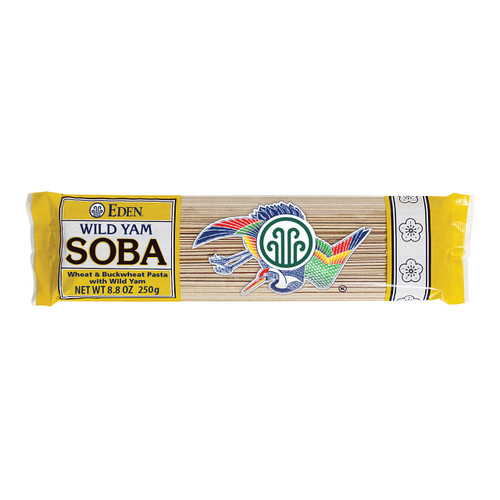Noodles of hard winter and spring wheat, whole buckwheat flour, and a bit of sea salt. Tanaka family traditionally made as they've been doing it since 1906. Warming, energizing, excellent winter fare, but satisfying in any season served hot or chilled. Versatile for stir-fries, salads, and with dashi - shoyu soy sauce kombu broth, or simply dip in or drizzle with Eden Ponzu sauce. They provide fiber, protein, and iron. Buckwheat is the best source of the important flavonoid rutin. ![]()
MORE DETAILS
Eden Soba is traditionally hand crafted by the Tanaka family using very old methods from hard red winter and spring wheat flour, whole buckwheat flour, and a bit of sea salt. They have been making noodles since 1906, now with four generations actively involved at their small shop. Soba is the Japanese word for 'buckwheat', an ancient health food. It is one of the most popular noodles in Japan.
Eden Soba begins with wheat flour sifted to remove bran and germ, which is reserved. A good percentage of the reserved bran and germ is added back into the dough as it is kneaded with pure water and sea salt. Salt binds the dough, enhances flavor, and preserves the dried pasta. Dough is rolled out and folded onto itself eight times, then cut to length. Long strands of noodles are lifted onto racks, rolled into drying rooms, and allowed to dry slowly for up to two days depending upon thickness and ambient temperature, humidity. Dutifully tended, they are hand-cut and packed when perfectly finished. Patience and a no-shortcut approach create superior texture, flavor, and ultimately well nourished well-being.
Commercial pasta is highly refined chemically treated flour, processed in minutes through teflon dies and ultra high heat or microwave drying, resulting in inferior flavor, diminished nutrition, poor cooking quality, and dubious value. Eden Soba is a wise choice. Light, delicious and nourishing because it's made with patience, care, the best ingredients, and handling that enhances value.
Nutritional Facts
Eden Soba is a good source of dietary fiber, protein, and iron. It is low fat and saturated fat and cholesterol free. Buckwheat is the best source of the important flavonoid rutin.
Eden Soba is warming, energizing, excellent winter fare, but satisfying in any season served hot or chilled. It is versatile for stir-fries, salads, and with dashi - shoyu soy sauce kombu broth, or simply dip in or drizzle with Eden Ponzu sauce. Use as you would any pasta in soups, salads, with your favorite sauce. It cooks in 7 to 10 minutes. Do not add salt to the cooking water. Unlike Eden Organic Soba and Udon, these traditional Japanese noodles are made with sea salt.
Traditional Cooking Instructions for Japanese Noodles
Soba and Udon can be boiled just like other pasta or you can use a traditional Japanese cooking method which takes a little longer but is well worth it. This method is called the shocking method, cold water is added to boiling water several times during the cooking process creating a firmer, al dente noodle. For this method place 2 quarts of cold water in a large pot, cover, and bring to a boil. Remove the cover, add the noodles, and stir to prevent sticking. As soon as the water comes to a boil again, add enough cold water to stop the water from boiling (about a 1/2 cup). Bring to a boil again, and add cold water again. Repeat one or two additional times until the noodles are done. Periodically check the noodles by removing a strand and biting or cutting it in half. If the center of the noodle strand is white and the outside is darker, the noodles are not done. When the center of the noodle is the same color as the outside, and the noodles are firm yet tender to the bite they are done. Rinse cooked Udon and Soba noodles under cold water. This lowers sodium and prevent clumping.



















